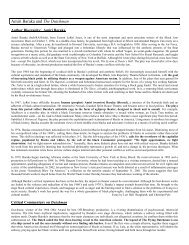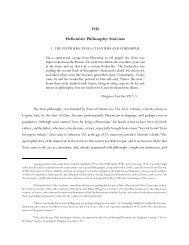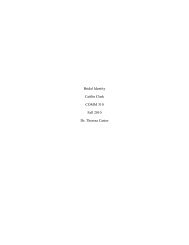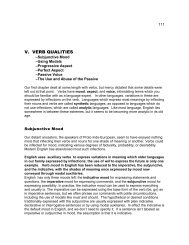Bibliography for Ancient Greek Philosophy - UW-Parkside: Help for ...
Bibliography for Ancient Greek Philosophy - UW-Parkside: Help for ...
Bibliography for Ancient Greek Philosophy - UW-Parkside: Help for ...
Create successful ePaper yourself
Turn your PDF publications into a flip-book with our unique Google optimized e-Paper software.
________ (1973; 2d ed. 1981). Platonic Studies. Princeton, New Jersey: Princeton University Press.<br />
________ (1983). “The Socratic elenchus.” Ox<strong>for</strong>d Studies in <strong>Ancient</strong> <strong>Philosophy</strong> 1: 27–58. Reprinted in Fine<br />
(1999), ch. 1.<br />
________ (1985). “Socrates’s disavowal of knowledge.” Philosophical Quarterly 35: 1–31. Reprinted in Fine<br />
(1999), ch. 2.<br />
________ (1987). “Socratic irony.” Classical Quarterly 37: 79-96. Reprinted in Benson (1992).<br />
________ (1988). “Elenchus and mathematics: A turning-point in Plato’s philosophical development.”<br />
American Journal of Philology 109: 362-96. Reprinted in Benson (1992).<br />
________ (1991). Socrates. Ironist and Moral Philosopher. Cambridge University Press; Cornell University<br />
Press. Rejects, in particular, Irwin’s view that Socrates was a hedonist.<br />
________ (1993). Studies in <strong>Greek</strong> <strong>Philosophy</strong>. Volume 1: The Presocratics. Volume 2: Socrates, Plato and their<br />
Tradition. Princeton University Press.<br />
Wallis, R.T. (1972, 2 nd ed. 1995). Neoplatonism. London and Indianapolis: Gerald Duckworth & Company and<br />
Hackett Publishing Company.<br />
Wedberg, Anders (1955). “The Theory of Ideas,” Ch. III of Plato’s <strong>Philosophy</strong> of Mathematics. Reprinted in<br />
Vlastos (1971b) ch. 3.<br />
________ (1982). History of <strong>Philosophy</strong>. Volume 1: Antiquity and the Middle Ages. Ox<strong>for</strong>d University Press.<br />
Perhaps the best short history of philosophy ever written. Wedberg provides extraordinarily clear and<br />
perceptive analyses of the arguments and positions of the various philosophers. He deals with<br />
philosophy in its connection with natural science, not religious thought.<br />
West, M.L. (1971). Early <strong>Greek</strong> <strong>Philosophy</strong> and the Orient. An excellent and judicious account, though probably<br />
not skeptical enough.<br />
Wheelwright, Phillip (1959). Heraclitus. Princeton, New Jersey: Princeton Unversity Press. Complete<br />
fragments in <strong>Greek</strong> and English, with detailed discussion of each one.<br />
White, Nicholas P. (1976). Plato on Knowledge and Reality. Indianapolis, Indiana: Hackett Publishing Company.<br />
Wians, William, ed. (1996). Aristotle’s Philosophical Development: Problems and Prospects. London: Rowman &<br />
Littlefield. A collection of classic pieces as well as surveys of contemporary work.<br />
Wilcox, Joel (1994). The Origins of Epistemology in Early <strong>Greek</strong> Thought. A Study of Psyche and Logos in Heraclitus.<br />
Studies in the History of <strong>Philosophy</strong>, 34. Lewiston, New York: The Edwin Mellen Press.<br />
Wilson, Brian R., ed. (1970). Rationality. New York, New York: Harper. A collection of essays bearing on<br />
the rationality of preliterate peoples and of their practices and beliefs. The pieces are chosen to<br />
represent the range of current views, and many show considerable philosophical as well<br />
anthropological sophistication.<br />
Windelband, Wilhelm (1899). A History of <strong>Philosophy</strong>. Revised edition. (First edition, 1892.) Translated by<br />
James H. Cushman. Reprinted in 2 vols. (Harper & Row: New York 1958).<br />
________ (2d ed., 1894). Geschichte der Alten <strong>Philosophy</strong>. Translated by James H. Cushman, 1899. Charles<br />
Schribner’s Sons.<br />
Woodruff, Paul (1990). “Plato’s early theory of knowledge.” In Everson (1990) 60-84. Argues that Socrates<br />
was a skeptic not about knowledge as ordinarily understood, but about “expert knowledge,” that is,<br />
the pretensions of the expert to a superior sort of knowledge rooted in an understanding of underlying<br />
realities.<br />
Woozley, A.D. (1971). “Socrates on disobeying the law.” In Vlastos (1971a).<br />
Zeller. A History of <strong>Greek</strong> <strong>Philosophy</strong> to the Time of Socrates (1881). Socrates and the Socratic Schools<br />
(1877). Plato and the Early Academy (1888). Aristotle and the Earlier Peripatetics (1897). Stoics,<br />
Epicureans and Skeptics (1880). Eclecticism (1885).<br />
Zeyl (1980). “Socrates and hedonism.” Phronesis 25: 250-269. Argues against the view of Nussbaum (1986)














